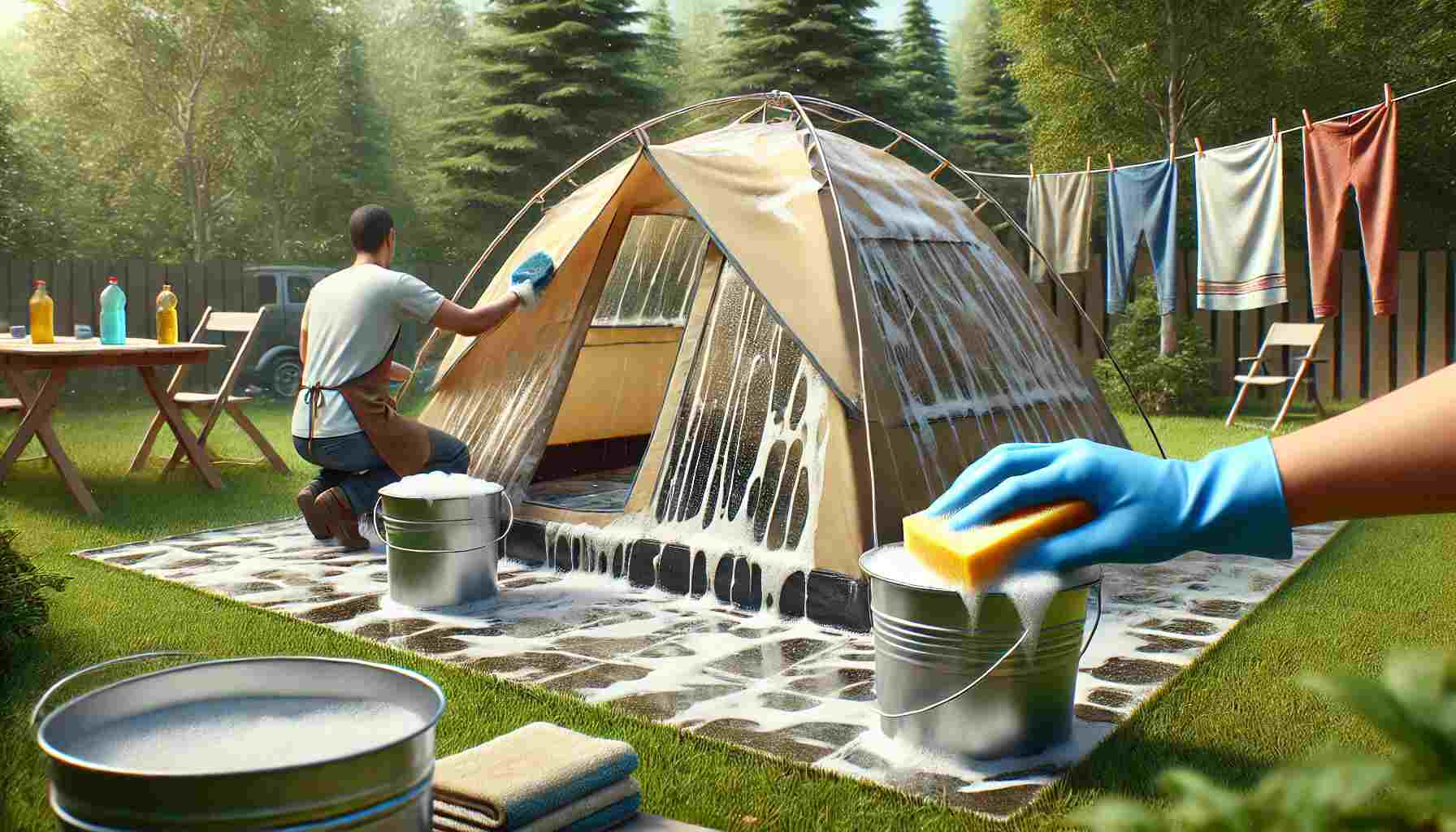Whether you’re an occasional camper or a seasoned outdoor enthusiast, knowing how to clean your tent properly will extend its lifespan and ensure it remains a reliable shelter. This guide covers everything you need to know about cleaning a tent, from basic maintenance to deep cleaning and storage tips.
Why Cleaning Your Tent is Important
Regular tent cleaning helps prevent mold, mildew, and odors. It also keeps the fabric and seams strong, ensuring your tent can withstand various weather conditions. Here are some key reasons to keep your tent clean:
- Longevity: Dirt, sand, and debris can cause wear and tear on the fabric and zippers.
- Hygiene: Prevents the growth of mold and mildew, which can cause health issues and unpleasant smells.
- Performance: A clean tent maintains its waterproofing and breathability, crucial for comfort and safety.
Basic Tent Cleaning Supplies
Before you start cleaning your tent, gather the necessary supplies:
- Mild soap or tent-specific cleaner: Avoid harsh detergents that can damage the fabric.
- Soft sponge or cloth: Non-abrasive to prevent scratching the tent material.
- Bucket of water: For rinsing and cleaning.
- Soft brush: For stubborn spots.
- Non-detergent soap: Optional, but recommended for delicate fabrics.
- Towels or air-drying space: For drying the tent after cleaning.
Step-by-Step Tent Cleaning Process
1. Setting Up for Cleaning
Find a clean, flat surface to set up your tent. Ideally, this should be outside to allow ample space and prevent further mess indoors. Avoid direct sunlight, which can degrade the fabric.
2. Spot Cleaning
Before washing the entire tent, inspect it for any spots or stains that need special attention:
- Mud and Dirt: Use a soft brush to remove loose dirt and mud.
- Sap and Resin: Apply a small amount of rubbing alcohol to a cloth and gently rub the sap until it loosens.
- Bird Droppings: Use a mild soap solution and a sponge to clean bird droppings.
3. Washing the Tent
Hand Washing
- Prepare a Cleaning Solution: Mix mild soap with water in a bucket. Avoid using hot water as it can damage the fabric.
- Submerge the Tent: Place the tent in the soapy water and gently agitate it. Use the sponge to clean the interior and exterior surfaces.
- Clean the Rainfly and Footprint: Wash these components separately using the same method.
- Rinse Thoroughly: Ensure all soap residue is removed by rinsing the tent with clean water. Leftover soap can attract dirt and degrade the fabric.
Machine Washing (If Allowed)
Check the manufacturer’s instructions before using a washing machine. If permitted:
- Use a Front-Loading Machine: Top-loading machines can damage the tent.
- Cold Water and Gentle Cycle: Use cold water and a gentle cycle with mild soap.
- Skip the Spin Cycle: Hand squeeze excess water to avoid damaging the tent.
4. Drying the Tent
Proper drying is crucial to prevent mold and mildew:
- Air Dry: Set up the tent in a shaded area with good airflow. Avoid direct sunlight.
- Use Towels: Pat the tent with towels to remove excess water.
- Dry All Components: Ensure the tent, rainfly, footprint, and guylines are completely dry before storage.
5. Storing the Tent
Store your tent in a cool, dry place. Avoid storing it in a compressed state; instead, use a large storage sack or hang it in a closet. This helps maintain the tent’s shape and prevents damage to the fabric and seams.
Deep Cleaning and Maintenance
For tents used frequently or exposed to harsh conditions, a deep cleaning may be necessary.
Removing Mold and Mildew
If you notice mold or mildew:
- Use a Tent-Specific Cleaner: Products like Gear Aid Revivex Pro Cleaner are designed for tents.
- Apply the Cleaner: Follow the instructions on the cleaner, typically involving soaking and scrubbing the affected areas.
- Rinse and Dry: Rinse thoroughly and ensure the tent is completely dry before storing.
Sealing Seams and Waterproofing
Maintaining the waterproofing and seam seals is essential:
- Check Seams: Inspect all seams for wear and tear.
- Apply Seam Sealer: Use a product like Gear Aid Seam Grip to reseal seams.
- Reapply Waterproofing: Use a spray like Nikwax Tent & Gear SolarProof to restore water repellency.
Repairing Damages
Address any rips or tears promptly:
- Use a Repair Kit: Many tents come with repair kits. Products like Tear-Aid are also effective.
- Patch Holes: Clean the area around the tear, apply the adhesive patch, and let it set.
Tips for Tent Care
- Avoid Eating Inside: Food attracts insects and animals, and spills can lead to stains and odors.
- Use a Footprint: A groundsheet protects the tent floor from abrasions and moisture.
- Ventilate: Open windows and doors when possible to reduce condensation and moisture buildup.
- Clean Regularly: A quick clean after each trip prevents dirt buildup and extends the tent’s life.
Top Recommended Products
Frequently Asked Questions
Can I Wash My Tent in a Washing Machine?
Always check the manufacturer’s instructions. If machine washing is allowed, use a front-loading machine on a gentle cycle with mild soap and cold water. Avoid using a top-loading machine or the spin cycle.
How Often Should I Clean My Tent?
Clean your tent after every camping trip, especially if it’s exposed to dirt, sand, or moisture. For occasional campers, a thorough clean at the end of the camping season is sufficient.
What Should I Do if My Tent Smells?
Persistent odors can be tackled by washing the tent with a mixture of water and vinegar or using a tent-specific cleaner. Ensure thorough drying to prevent mold and mildew, which cause odors.
How Can I Prevent Mold and Mildew?
Store your tent only when it’s completely dry. Use a breathable storage sack and keep it in a cool, dry place. Regularly clean and dry your tent after each use.
Is It Necessary to Reapply Waterproofing?
Yes, reapplying waterproofing periodically ensures your tent remains water-resistant. Use a spray-on waterproofing agent designed for tent fabrics.
Conclusion
Keeping your tent clean is a simple but crucial aspect of tent maintenance. By following these steps, you’ll ensure your tent remains in good condition, providing reliable shelter for many adventures to come. Regular cleaning, proper drying, and appropriate storage will keep your tent fresh, durable, and ready for your next outdoor excursion.
By taking the time to clean and care for your tent correctly, you’re not only prolonging its life but also ensuring that each camping trip is as comfortable and enjoyable as possible.







